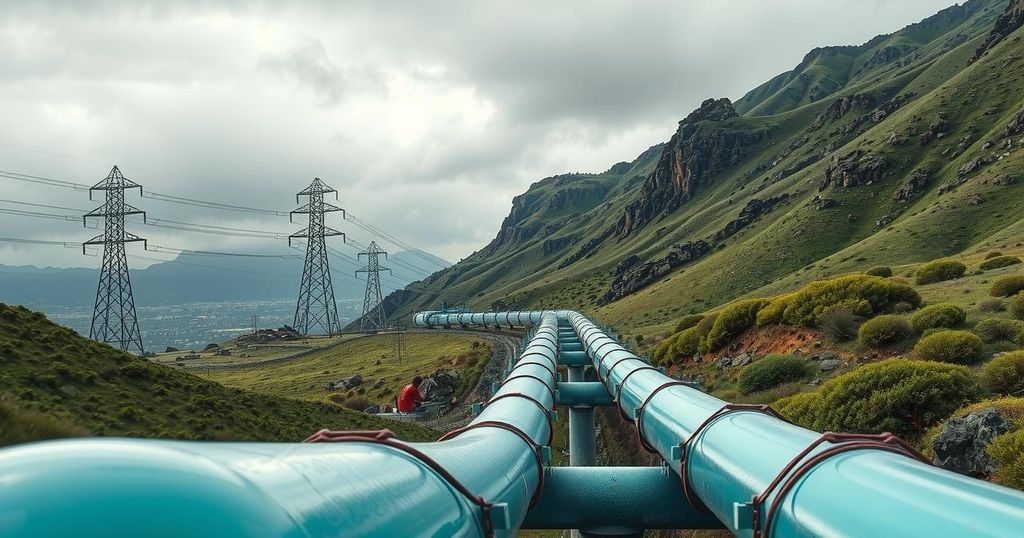Companies
BARRANQUILLA, CALI, COLOMBIA, CUBA, ECOPETROL S. A, EMPRESAS PUBLICAS DE MEDELLIN, EMPRESAS PÚBLICAS DE MEDELLÍN, ENERGY, ENERGY PRICES, EPM, FITCH, GASCARIBE, GASES DE OCCIDENTE, GASES DEL CARIBE, GDO, GLOBAL ECONOMY, MEDELLÍN, MINING, NATURAL GAS SUPPLY, NORTH AMERICA, PROMIGAS S. A. E. S. P, SOUTH AMERICA, SUR, SURTIDORA DE GAS DEL CARIBE, SURTIGAS, TGI, TRANSPORTADORA DE GAS INTERNACIONAL S. A. ESP, VANTI
Fatima Khan
0 Comments
Colombia Prepares for Rising Energy Costs Amid Growing Natural Gas Shortage
Colombia is expected to experience rising energy costs due to increased reliance on imported natural gas as domestic production declines. Existing regulatory frameworks may allow energy companies to pass costs to consumers, but political and economic pressures may arise. The situation is further complicated by diminishing gas reserves and financial strains on electricity distribution companies.
Fitch Ratings forewarns that Colombia may encounter escalating energy costs in the coming years, primarily due to a heightened dependence on imported natural gas. This necessity arises from an increase in demand coinciding with a decline in domestic gas production. While the country’s regulatory framework permits energy companies to transfer these heightened costs to consumers, it is anticipated that political pressures may intensify as the broader economic ramifications of increased costs become evident.
Hydroelectric power remains the predominant source of electricity generation in Colombia; however, gas-fired electricity is crucial for providing stable supply during periods of drought or surges in demand. Historically, Colombia has enjoyed self-sufficiency in natural gas. However, with imports accounting for nearly 20% of consumption in 2024—attributable to reduced hydroelectric generation and domestic production challenges—the situation is becoming critical.
Industry analysts predict a worsening structural deficit in natural gas, with domestic production anticipated to meet a mere 88% of projected consumption in 2025, diminishing further to 70% in 2026. Key gas transporters, such as Transportadora de Gas Internacional S.A. and Promigas S.A.E.S.P., are heavily investing in infrastructure to facilitate increased imports and improve national connectivity while supporting new onshore gas endeavors.
In February 2025, retail gas prices surged in various regions, with Vanti implementing a 36% increase in Bogotá and Empresas Públicas de Medellín enacting a 21% hike in Medellín. Other gas distributors, including Gases del Caribe and Surtidora de Gas del Caribe, have managed to maintain domestic supply and moderate price changes by leveraging resources in smaller gas fields located in Colombia’s northern and southwestern regions.
Colombia’s proven gas reserves are diminishing, with estimates suggesting only six years of supply will remain by 2025, based on the current production rate of 965 GBTU per day. Dominated by two major producers, Ecopetrol S.A. and Canacol Energy Ltd., production rates have experienced a decline, particularly in significant fields such as Cusiana and Cupiagua, where output decreased from 550 GBTU per day to 425 GBTU per day over the last year.
The drop in domestic gas production is partially due to geological constraints and has been exacerbated by governmental policies that discourage investments in the oil and gas sector. In a groundbreaking move in 2023, Colombia became the first Latin American nation to ratify the Fossil Fuel Non-Proliferation Treaty at COP28, subsequently ceasing to issue new oil drilling and exploration contracts.
Colombia’s gas distributors operate within a regulated tariff framework that allows for the transfer of supply costs to consumers. However, rising energy prices may elevate the working capital requirements for these companies, compounding existing political pressures throughout the value chain.
Despite existing regulatory protections, the financial health of Colombia’s electricity distribution companies is being compromised by the rise in energy prices and subsequent political involvement. The sector has encountered financial difficulties, notably due to tariff increase restrictions imposed during the pandemic and the government’s fiscal constraints, which have caused delays in subsidy payments. Empresas Públicas de Medellín is expected to extend financial support to its subsidiary Afinia, which has been adversely affected by these payment delays.
In summary, Colombia is facing a critical energy situation characterized by a significant dependence on imported natural gas and the decline of domestic production. The structural gas deficit poses a threat to economic stability, exacerbated by rising consumer costs and political pressures. As investments in energy infrastructure increase, the challenges of regulating prices and managing financial implications for distribution companies remain critical to the future of Colombia’s energy market.
Original Source: www.financecolombia.com




Post Comment